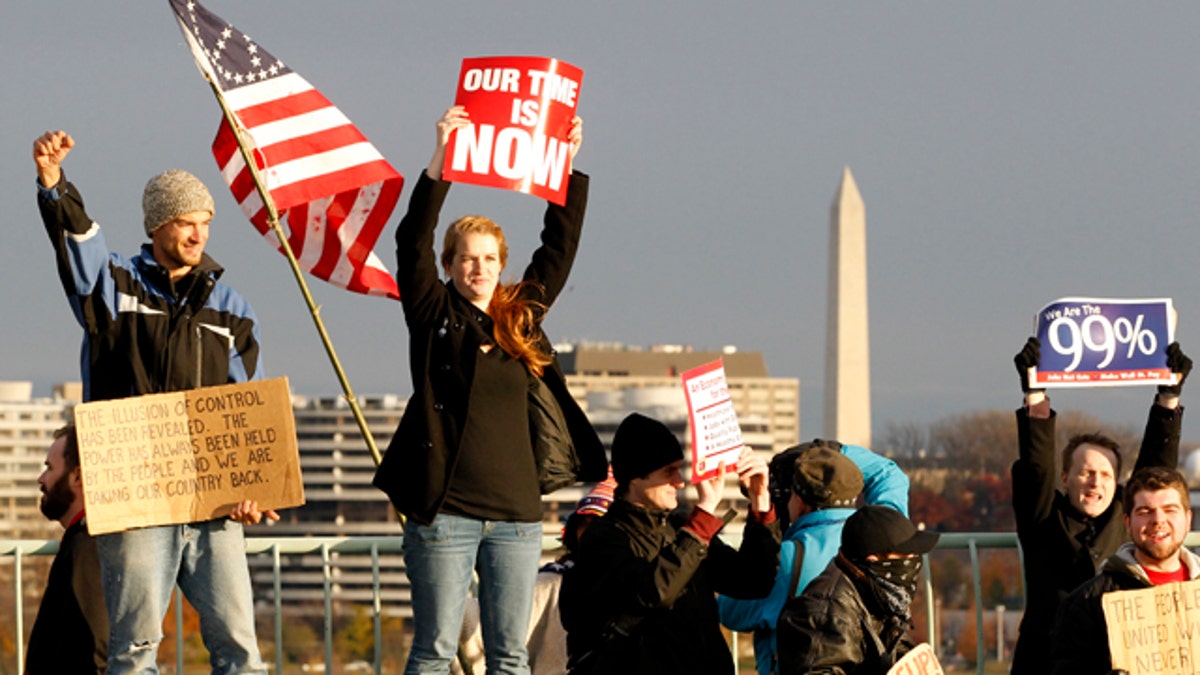
Nov. 17, 2011: Demonstrators stand on the Key Bridge in Washington, D.C. (AP)
Washington, D.C., really knows how to enjoy a good protest.
Whether it's the Million-Man March or the perennial demonstrations against the World Bank and International Monetary Fund, a protest in the nation's capital is like rain in Seattle -- likely to break out at any moment and something residents live with, even welcome.
So it should come as no surprise that D.C. officials are greeting the Occupy D.C. protesters with open arms, while New York and other cities move to break up their encampments and slap cuffs on the trouble-makers.
Earlier this week, D.C. council members told reporters the protesters could stay. Councilman Phil Mendelson said the city shouldn't "overreact." Councilman David Catania told The Washington Post the occupiers have been "unobtrusive."
Despite the anti-capitalist message of the Occupy movement, protests can actually be good for business in the District. In places like Oakland, tourists don't generally travel there to make their peace. But in D.C., a protest is a destination event. People from all over the country arrive to protest for or against abortion rights, for or against immigration reform, for or against tax hikes.
And that means new customers.
"It gives an increase in sales," said Margaret Singleton, executive director of the D.C. Chamber of Commerce.
How much of an increase is tough to track. And the impact on the local economy depends in part on the crowd.
With Occupy protesters swarming near Georgetown on Thursday, and more on the march from New York City to D.C. and set to arrive next Wednesday, Singleton said businesses will probably make money off them. But the Occupy crowd and their frugal ways might not represent the most profitable influx of righteous indignation for Washington's shopkeepers and hotel managers. So far, their numbers pale in comparison to the crowds at other major D.C. protests.
Kate Gibbs, spokeswoman with the city's marketing group Destination DC, said Occupy protesters -- those not in tents, anyway -- will probably end up sleeping on couches and might not have much impact on business.
"We don't anticipate them staying at the JW Marriot and then protesting on Freedom Plaza," she said.
Some protests do bring an unexpected windfall. During the "Rally to Restore Sanity and/or Fear" with Jon Stewart and Stephen Colbert in October 2010, the local hotel industry saw a boom in business. According to stats provided by Destination DC, hotel occupancy that day was 97.1 percent -- compared with 39 percent the year prior. Gibbs said the upper-middle-class crowd might have helped.
Occupancy the day before the Glenn Beck rally in August 2010 also was close to 97 percent, well above average.
Other major protests over the past few years coincided with similar increases in hotel occupancy, though it's impossible to say how much of that was due to protesters alone. The IMF meetings this past September coincided with high occupancy rates, but a large part of that was surely from those attending the meetings themselves. Other factors like whether Congress is in session or other conventions are in town contribute as well.
During the National Equality March in 2009, hotel occupancy was actually down from a year prior.
Regardless of whether Occupy helps the D.C. economy, city officials and residents nevertheless have a high tolerance for civil disobedience. That's not to say the protests always go smoothly. Earlier this month, protesters were hit by a car while demonstrating outside the building where an Americans for Prosperity summit was being held.
It helps that D.C. is built for large crowds. The city is able to accommodate demonstrations of all stripes without much trouble -- where else could thousands of farmers rally on their tractors, as they did in 1979 in protest of farm policy for a demonstration known as "Tractorcade"?
"We have wide boulevards, we have extraordinary security, there are permitting plans in place," Gibbs said.
Plus it's possible to hold a massive demonstration in Washington without waking up the neighbors. Protests on the National Mall, or by the Lincoln Memorial, are nowhere near the city's residential areas.
Contrast that against the scene in New York, where residents are shoulder-to-shoulder with protesters and local officials are losing patience.
Rep. Michael Grimm, R-N.Y., held nothing back in a statement Thursday, urging protesters to "pack up their tents, buy a bar of soap, and head home."
"Between the filth, the smell, the incessant noise, and threat to public safety, they have done nothing but cause a nuisance to the people who work and live in Lower Manhattan," he said.
D.C. businesses hope not all of them are sleeping in tents.
"I'm sure everyone is not necessarily sleeping out," Singleton said. "There probably are some rooms that are being occupied."




